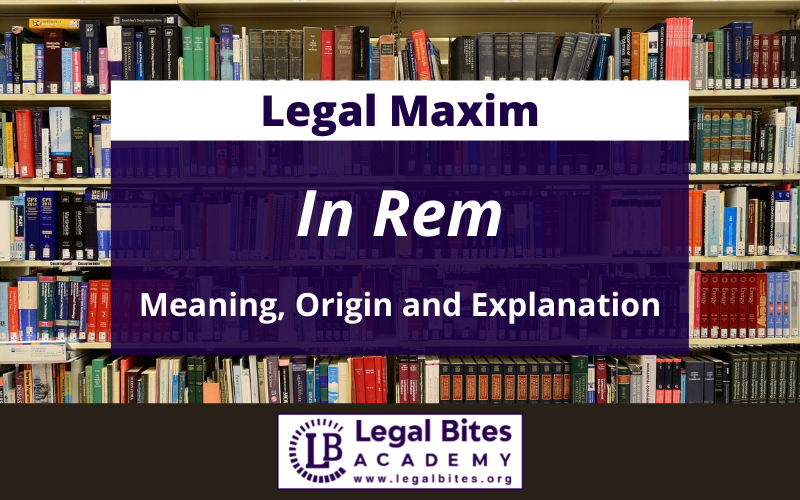In Rem: Origin, Meaning and Explanation
This article titled ‘In Rem: Origin, Meaning and Explanation’ is written by Sahajpreet Bhusari and discusses the legal maxim of In Rem. I. Origin and Meaning In rem is a legal phrase of Latin origin. In Latin, the phrase literally means ‘against a thing’ as opposed to in personam which is a right against an individual.[1] II. Explanation and… Read More »

This article titled ‘In Rem: Origin, Meaning and Explanation’ is written by Sahajpreet Bhusari and discusses the legal maxim of In Rem. I. Origin and Meaning In rem is a legal phrase of Latin origin. In Latin, the phrase literally means ‘against a thing’ as opposed to in personam which is a right against an individual.[1] II. Explanation and Application In rem is a legal term that refers to the authority that a court has over the property (real or personal) or...
This article titled ‘In Rem: Origin, Meaning and Explanation’ is written by Sahajpreet Bhusari and discusses the legal maxim of In Rem.
I. Origin and Meaning
In rem is a legal phrase of Latin origin. In Latin, the phrase literally means ‘against a thing’ as opposed to in personam which is a right against an individual.[1]
II. Explanation and Application
In rem is a legal term that refers to the authority that a court has over the property (real or personal) or a “status” against a person over whom the court has no jurisdiction in personam. The term “jurisdiction in rem” refers to a case in which the property or status is the major focus of the litigation rather than personal culpability unrelated to the property.
In general, in rem refers to a lawsuit or other legal action brought against a piece of property rather than a specific individual. The phrase is significant since the location of the property determines which court has jurisdiction, and a judgement must be enforced against the property rather than a person. ‘In rem’ is distinct from ‘in personam,’ which is addressed at a specific individual.
An action in rem is a court proceeding that ignores the property owner and establishes rights in the property that are conclusive against all others. The goal of in-rem procedures is to determine the property’s disposition, regardless of who owns it or who else may have a stake in it. A case may be made out by interested parties, but the action is in rem, or against the things, i.e. the property.
III. Illustration
The action is said to be ‘in rem’ when the issue before the court is the title to a property. The power of a court over real or personal property is referred to as in-rem jurisdiction. When it comes to property, in-rem jurisdiction is based on where the property is located, and enforcement follows the property rather than a person.
IV. Case Laws
“Roman lawyers recognised a right either as jus in rem or jus in personam,” the court said in R. Viswanathan v. Rukn-Ul-Mulk Syed Abdul Wajid[2].
In personam is a right against or in respect of a person and according to its literal sense, in rem is right in respect of a thing.
A right in rem presupposes a duty owed to all people in general, but a right in personam presupposes a duty owed to a specific person or group of people.
References
[1] In Rem, Available Here.
[2] 1963 AIR 1 1963 SCR (3) 22.


